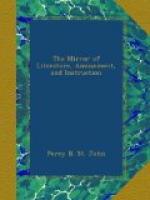The ingenuity and hardihood of these men is surprising. Despite the vigilance, the ramparts, the fetters, and the logs, they escape hourly and daily;—at what risk is manifest from the regulations, by which three cannon shots always announce the disappearance of a convict, serving to warn the peasants, and call them to earn the handsome reward given to whoever arrests one of the branded fugitives. They are easily recognised by the halt in one limb; as they are wont to drag after them that which has been accustomed to the bullet.
The only pursuits that seem to pervade the bagne, are those of eating and dying: with the exception of escape, all others are denied. And those who have given up the latter hope, confine their thoughts either to bettering their meagre fare of beans, or to getting rid of existence in the most advantageous way. It is remarkable and degrading to observe the utmost human ingenuity and industry employed, in order to procure a dish of potatoes fried in grease once in the week. Yet such is the luxury of a forcat, and he must labour for it harder than even an Hibernian peasant, or a poet of the same line.
The more philosophic, who scorn the luxury of potatoes, and with it the life that affords no other, meditate how best to get rid of existence; and this they effect almost ever in one way; viz., by killing their most obnoxious keeper, and thus earning the guillotine.
It is a frequent scene in the bagne, that of an execution. It occurs every week or fortnight. All the convicts are obliged to attend, for the purpose of striking them with terror, and working contrition and good behaviour in them. Alas! it is a huge mistake. For these days are of all other days of fete to them. Their countenances are marked by universal joy, and they shout congratulations, not condolences, to their comrade about to perish. Death to them is indeed an escape. Its ceremony is to them a marriage feast: and decapitation, what a black job was to Lord Portsmouth,—the only variety and excitement that could give a spur to their heavy and painful existence.
Speak as we may against the pains of death, this is worse, not only physically but morally; for it degrades humanity far lower than is conceiveable. The French have an idea that they can imitate the American mode of punishment by solitary confinement. This again will be still worse than the galleys; since religious consolation can alone redeem or ameliorate man in this state of durance; and as this makes no part of the French system, I cannot help thinking the guillotine more merciful, than either their bagne or their solitary cells.—Monthly Magazine.
* * * * *
THE SEALS.
Written at the suggestion of a Lover who inferred the decline, of his mistress’s affections from her changing the seals of her letters.




